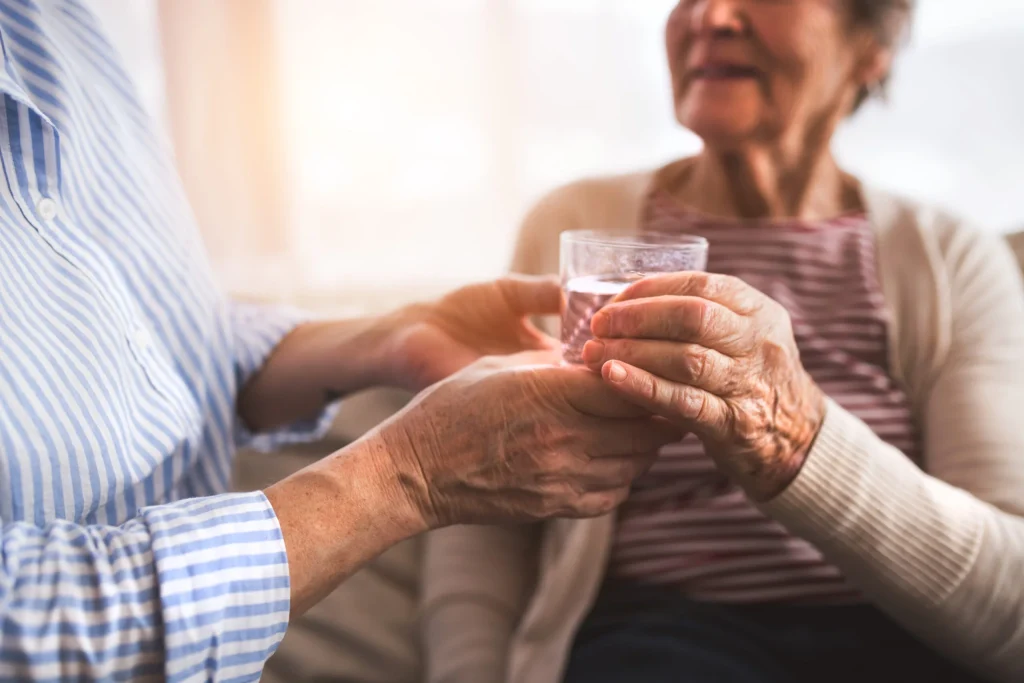
10 Symptoms of Dehydration in Elderly Woman
In this article from Human Health Mag, we are going to get acquainted with symptoms of dehydration in elderly woman. In general, lack of water and the health of elderly people are directly related. If you have an elderly person in your family or around you, you may have noticed that they drink much less water than others! But have you thought about the fact that this can lead to dehydration in elderly?
In most cases, the reason for the decrease in the feeling of thirst in dear elderly people is the physiological changes in the body that occur with age, and their infection with some diseases and increasing physical or mental weakness are also effective in this. If you are taking care of an elderly person, it is necessary to become familiar with the effects of dehydration in the elderly and ways to prevent it. In this article, we provide complete and useful information on this matter.
Why Should Dehydration in the Elderly be Taken Seriously?
Before talking about symptoms of dehydration in elderly woman, let’s first examine the importance of dehydration in elderly men and women. The problem of dehydration in the elderly is more common than in young people. If this is ignored, it can lead to bad consequences such as the risk of infection or a problem that in psychology is called disorientation (a disease that causes a person to be unaware of the time and place in which he is).
If the symptoms of dehydration in the elderly are not diagnosed and treated in a timely manner, it will have serious consequences. Therefore, family members or nurses who take care of the elderly should always monitor the symptoms of dehydration in the body of these loved ones and encourage them to drink enough water. So you should take the symptoms of this problem seriously to prevent the consequences of dehydration on the health of the elderly.
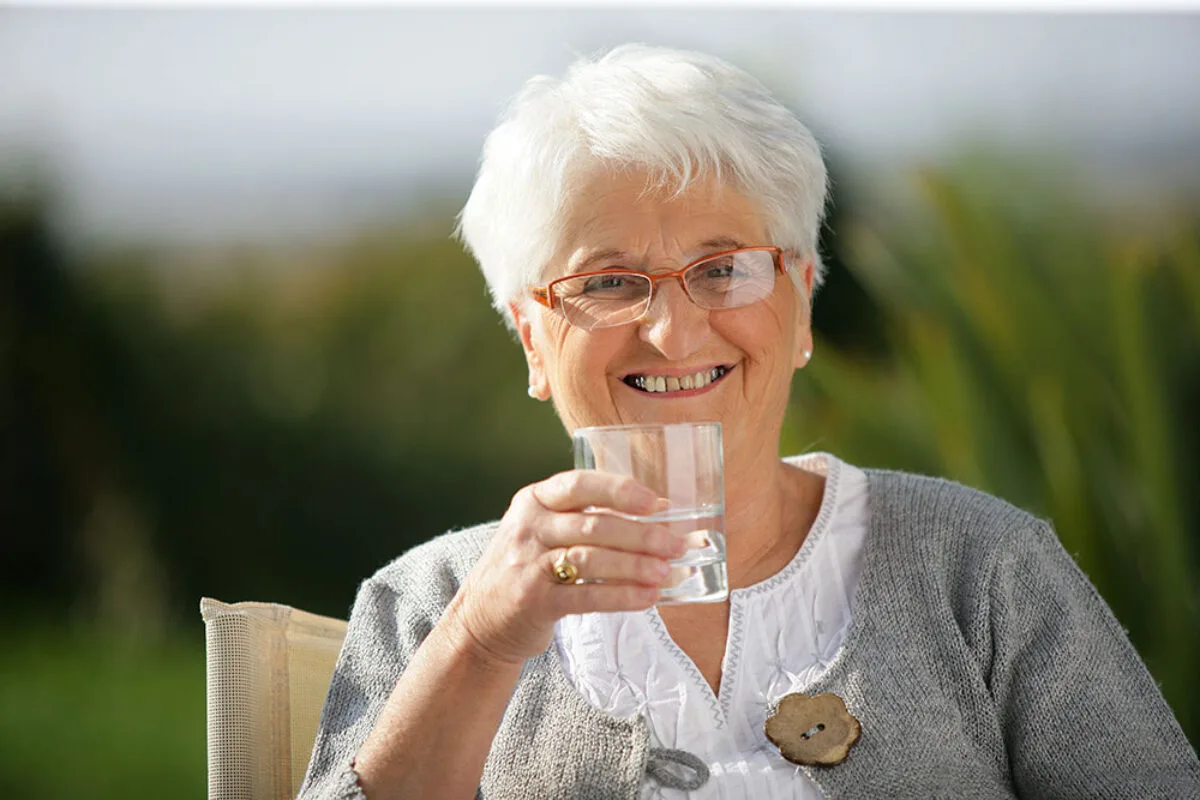
Impact of Dehydration on the Mental and Physical Health of the Elderly
Although it is often difficult to diagnose dehydration in the elderly, some of the effects and symptoms of dehydration in elderly woman on its mental and physical health include the following:
- Dizziness
- Feeling tired
- Feeling cramped
- Dry mouth
- Sunken eyes
- Decreased urination
- Dark and foul-smelling urine
The following are more serious symptoms and dangerous effects of dehydration on the body of the elderly:
- Rapid heartbeat
- Having difficulty walking
- Fainting
- Higher body temperature than normal or hyperthermia
- Unconsciousness or confusion
- Formation of kidney stones
- Urinary problems
According to the global website HealthLine, the amount of fluids a person needs is sometimes based on weight. Some calculations suggest that people should drink half their body weight in water. For example, if a person weighs 200 pounds, they should drink 100 ounces of water daily. People also get about 20 percent of their fluids from foods. Note that older people and their caregivers should know what foods should old people not eat, because some foods also cause thirst and increased thirst in older people and lead to dehydration.
Some Symptoms of Dehydration in Elderly Woman
1- Dry skin
- A lack of water can cause dryness and cracks in the skin in the elderly, which can lead to wounds and skin infections due to lack of freshness of the skin. Of course, women can compensate for the problem of dehydration to a large extent by consuming healthy smoothies for the elderly.
2- Increased fatigue and weakness
- Since the process of cellular activity of the human body requires water molecules for proper reproduction and proper energy transfer, water deficiency can cause increased fatigue, muscle weakness, and also reduced energy in the elderly.
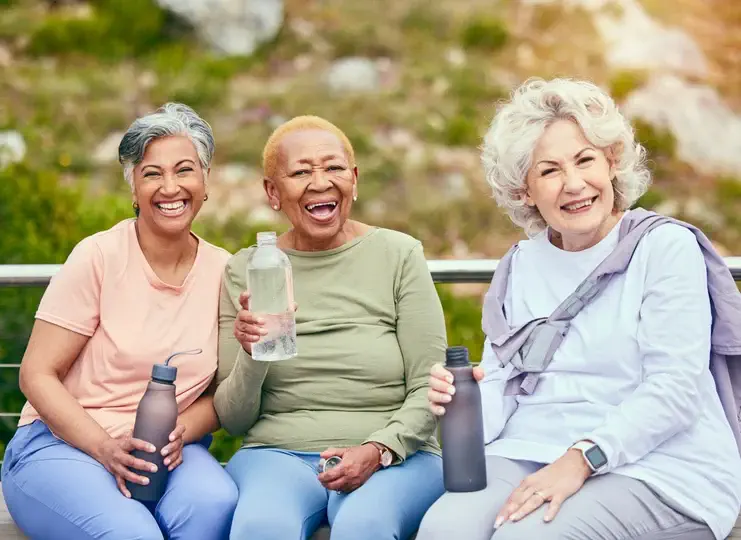
3- Kidney problems
- The function of the kidneys is to purify the blood. In the process of purifying the blood, the kidneys purify water and salts in the blood from harmful substances. The lack of sufficient volume for purification and activity of the kidneys can cause severe damage to the kidneys, which is called ATN. If the kidneys enter the Acute Tubular Necrosis phase due to lack of water, the consequences can also lead to dialysis.
4- Hypotension
- The largest volume in human blood circulation is made up of intravascular water, so that 91% of the plasma volume is made up of water. Therefore, lack of water can cause low blood pressure in the elderly, which can create a greater risk of cardiovascular diseases.
5- Digestive problems
- The digestive system needs enough water to absorb and reabsorb for mental activity and to prevent constipation. The lack of enough water in the digestive system can cause constipation and therefore cause other digestive problems in the elderly.
6- Oral and dental diseases
- To secrete saliva and also create digestive enzymes in the mouth, the salivary glands require water for their activity. If, due to dehydration, the body cannot respond to the amount of water for the activity of these glands, the mouth becomes dry and causes ulcers and dental damage (tooth decay).
7- Darkness under the eyes
- With a decrease in the body’s water volume, the amount of carbon dioxide in the blood increases, and this condition causes the overall darkness of the blood. The thinnest areas of the skin, the most important of which can be mentioned under the eyes, become dark and dull as this blood circulates.
8- Delirium
- Another effect of water deficiency in the elderly is lethargy and brain weakness and the development of delirium and delirium. This symptom can be resolved by eliminating dehydration in the elderly.
9- Severe infections
- The lungs need enough water to remove microorganisms, lung cleansing activity to create mucus and phlegm, the kidneys need water to function properly, and urinary tract infections can occur from excessive dryness of the ducts. In general, lack of water can also affect the development of infections in various body systems.
10- Poor vision
- The possibility of worsening cataracts (cataracts), dry corneas, and decreased vision is also very high in elderly people with dehydration.
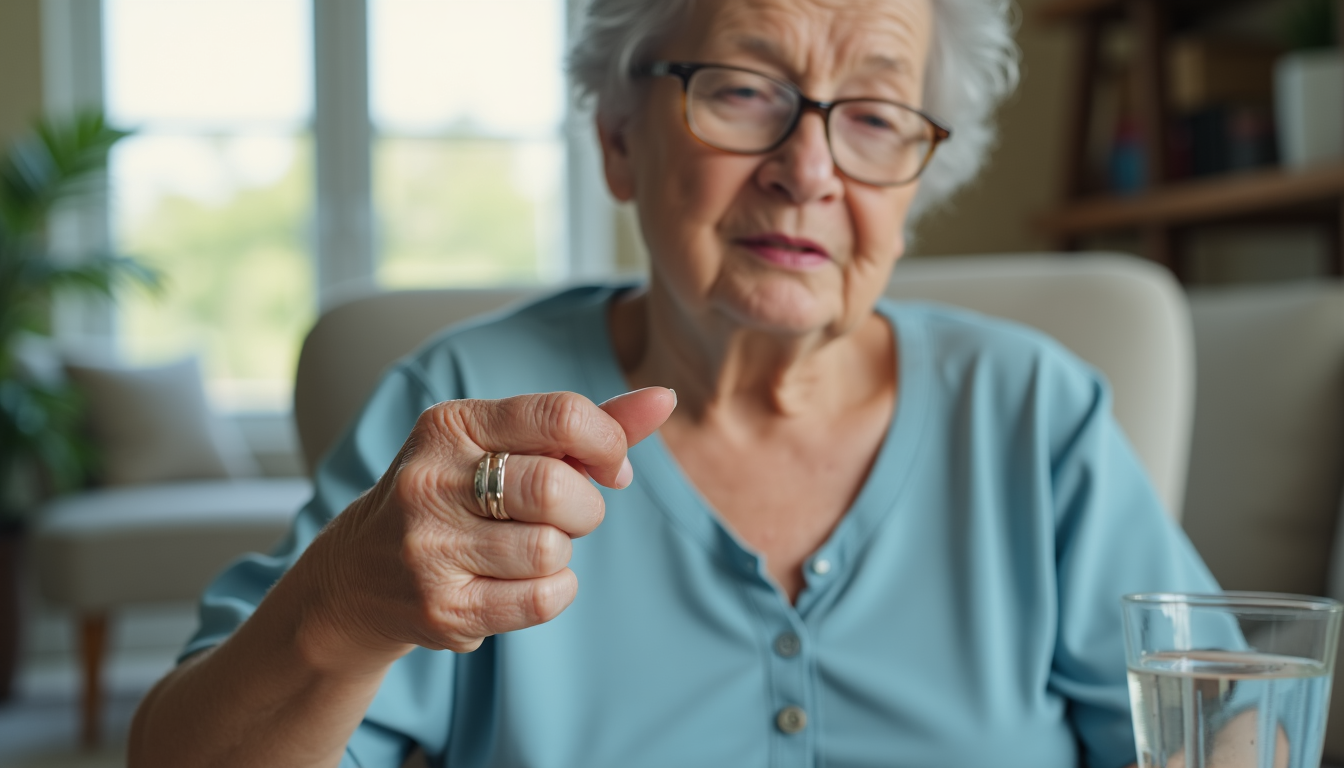
How to Diagnose Dehydration in Elderly Women
After learning about the symptoms of dehydration in elderly women, it is time to learn how to diagnose dehydration in elderly women. Diagnosing dehydration in the elderly is possible in various ways. These methods include observing signs and symptoms of dehydration, performing relevant diagnostic tests, and reviewing the individual’s medical history. Below are some methods for diagnosing dehydration in the elderly:
- Checking for signs and symptoms: The doctor may suspect dehydration in the elderly by examining signs and symptoms such as dry mouth, decreased urine volume, unusual fatigue, dizziness, confusion, blurred vision, and changes in mental and cognitive status (such as inadequate concentration and memory loss).
- Blood and urine tests: Blood and urine tests can help the doctor assess the dehydration status of the elderly. Useful tests include testing the concentration of BUN (urea in the urine), creatinine (kidney cell azine) and electrolytes in the blood such as potassium, sodium and calcium. The higher the blood sodium level, the more severe the dehydration.
- Medical history review: The doctor may review the person’s medical history to check for factors such as taking diuretic medications (such as furosemide), chronic diseases (such as diabetes or cardiovascular disease), or kidney problems that may increase the risk of dehydration in the elderly.
- Weight assessment: Changes in weight can also indicate dehydration. The doctor may pay attention to changes in the person’s weight as an important sign of changes in the body’s hydration status.
Risks of not Paying Attention to Symptoms of Dehydration in Elderly Woman
Paying attention to symptoms of dehydration in elderly woman is very important. The body must be adequately supplied with water, and even small amounts of it can cause problems. For example, we can mention the impact on mental performance, which unfortunately many elderly people experience intermittently or permanently. In conditions of dehydration in the elderly, a person feels more tired, and this can have a significant impact on brain functions such as memory, attention, reaction ability, and concentration. Some of the most important risks of not paying attention to dehydration are:
- In the case of dehydration, an elderly woman may experience a severe drop in blood pressure. The less water these people have, the more exposed they will be to this disease.
- If you feel that your elderly person is regularly facing problems such as physical weakness, you can give the possibility of dehydration. Following weakness and the need for more food, dizziness will also come to people.
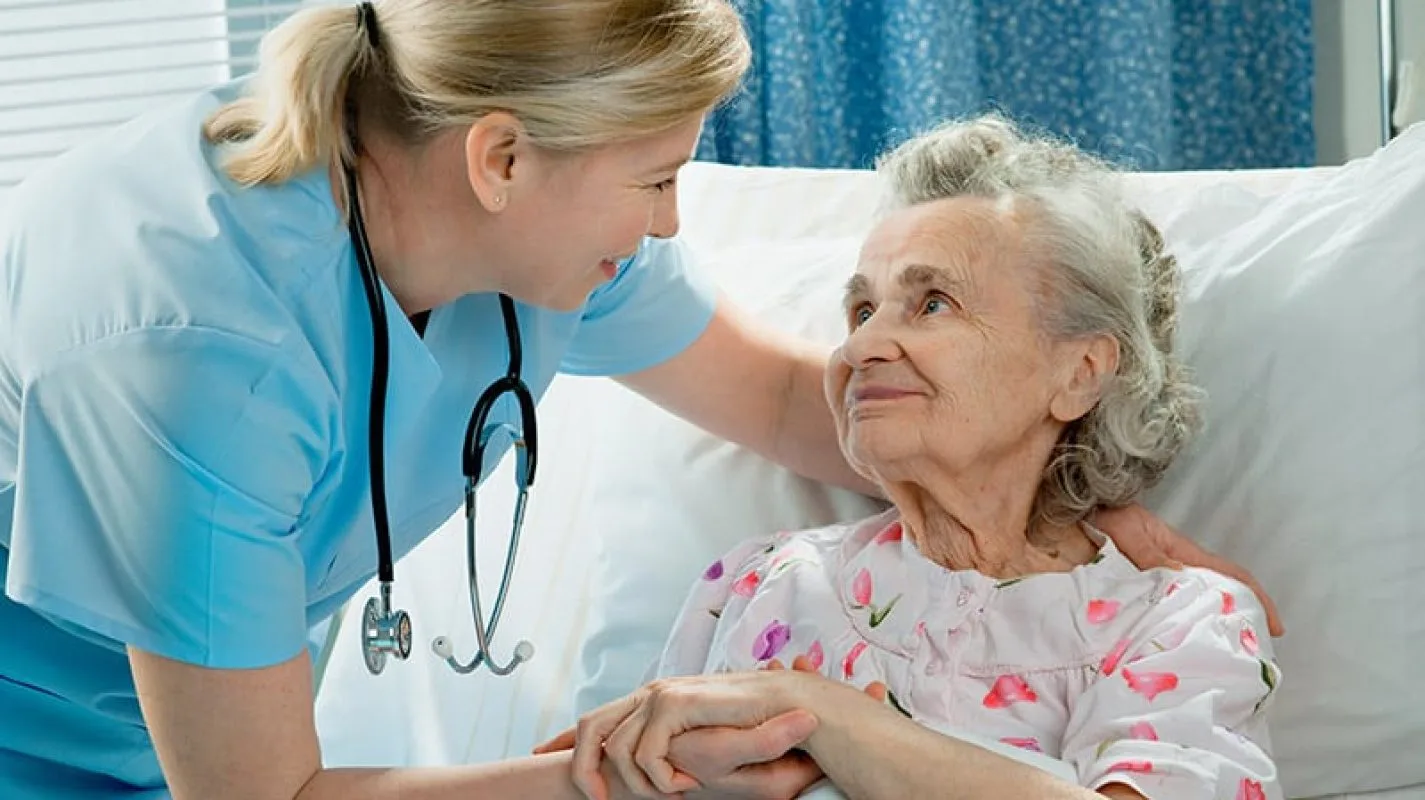
- Elderly people with dehydration problems sometimes lose their balance, and this may seem to be for no apparent reason.
- Skin ulcers on the body of these people have various reasons, and dehydration can be one of them. Of course, continuous and regular consumption of water will have a great impact on eliminating all types of ulcers.
- Finally, it should be mentioned that damage and infection of the urinary tract and kidneys, along with constipation, are unfortunately common among many elderly people these days.
Many elderly people think that by not drinking fluids, especially at night, they can deal with the problem of urinary incontinence during sleep, while this is completely wrong. Studies show that not drinking water at night, apart from having many destructive effects on the body, will not have any effect on the frequency or severity of urinary incontinence at night.
Preventing Dehydration in Elderly Women
By knowing the symptoms of dehydration in elderly woman, this problem can be easily prevented. This is very important and can be done by taking simple and regular measures. Children and caregivers of elderly people at home can be very helpful in controlling these symptoms. Below are some methods to prevent dehydration in the elderly:
- Regular water consumption: Elderly people should drink water regularly and continuously to prevent dehydration. Encouraging them to use drinks such as water, tea, herbal teas, or soup with meals can help with this.
- Careful monitoring of fluid intake: The elderly nurse who is responsible for caring for and maintaining the elderly should ensure that the elderly consumes enough fluids, especially in hot weather, which requires more water.
- Providing water continuously: The environment in which the elderly live should have easy access to containers containing water. Suppose an elderly person who has had a stroke and does not have the normal movement to reach the refrigerator or tap will need to have water containers available to him so that he can easily access water.
- Fluid intake and output chart: You can ensure that their water needs are met by measuring the amount of fluid consumed by the elderly on a continuous and continuous basis.
- Education: Teach your elderly person to inform you when they need to consume and drink water so that their water needs can be met accordingly.
- Monitoring medication intake: If the elderly are taking medications that increase urination, the volume of fluid intake should also be controlled according to the doctor’s instructions.
Concluding Remarks
In this article, we have outlined the most important symptoms of dehydration in elderly woman. It is important to recognize these symptoms, so you can try to replace lost fluids in older women. In these individuals, you should look for symptoms such as dry mouth, fatigue, dark urine and lightheadedness. Treatment of dehydration involves replacing lost fluids. You can try to prevent dehydration by ensuring that older women consume fluids regularly throughout the day. This can include water, fruit juice or foods with a high water content.
It is best to remind older people to stay hydrated throughout the day, especially at mealtimes and after exercise. Keep water in places where it is easy to access. If you are worried that the elderly person will not be able to get to the toilet in time, make it easier to access it after drinking fluids.
Could you help us make this content even better? What do you love, and what can we improve? Share your thoughts below, feedback is the key to creating better content for you.

Frequently Asked Questions
What Should an Elderly Person Eat to Control their Body Fluid Volume?
Dried apricots, apricot seeds, avoiding carbonated drinks, and consuming soup along with large meals can cover sufficient fluid volume in the elderly.
My Mother Has Dry Skin, Do You Think it is Due to Lack of Fluids?
One of the most important causes of decreased skin turgor is low water. It is better to first adjust and compensate for the fluid intake of your elderly person, and then seek help from a nutritionist at home to correct the amount of vitamins your elderly person needs.
Can Frequent Fevers in the Elderly be the Result of Dehydration?
Yes, one of the signs and symptoms of dehydration in elderly woman is fever. If this resolves but the elderly person still has frequent fevers, you should consult an infectious disease specialist.
